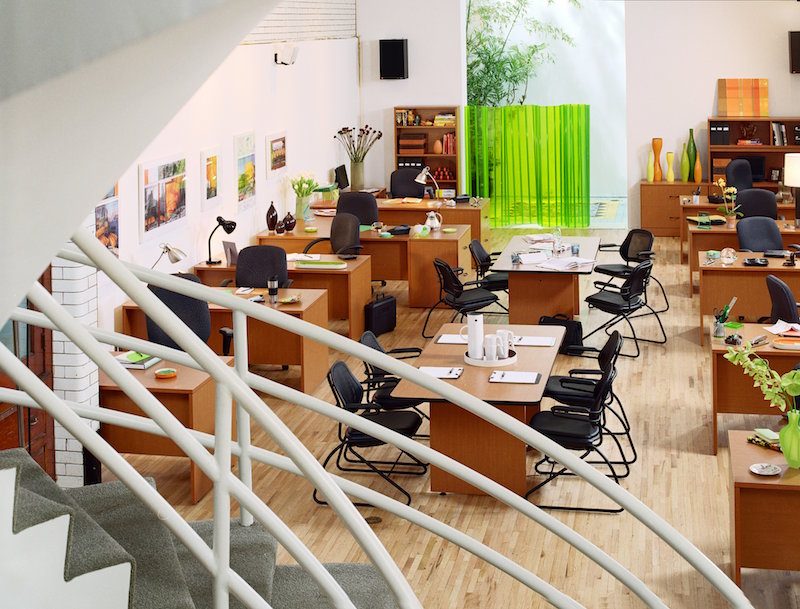With total U.S. construction starts projected to rise by 6 percent in 2016, the construction industry continues on its steady rise. Its expansion is contributing to an increase in corporate projects and profits. To make the most of the upturn, construction companies are having to focus on keeping costs low, working to allocate resources in the most efficient and effective manner possible.
As commercial and institutional building starts increase, it is essential to keep your company’s current projects on time and on budget, all while pursuing the market’s wealth of new leads. One way this challenge can be met is by exploring options that avoid investing time and money into purchasing and managing permanent assets.
There are many benefits to renting instead of purchasing assets for a construction site. Construction sites are dynamic, ever changing and require temporary workspaces to get the job done. Instead of purchasing resources to fill these transitory spaces, renting or leasing equipment that is needed for only the duration of the project can often reduce your company’s capital expenditures. Rental helps to ensure that your time and money is spent managing the projects, not the assets. Several kinds of on-site resources can be leased with these benefits.
For example, furniture rental is a viable alternative to purchasing permanent assets. Furniture rental eliminates the costs of storing on-site furniture between projects, making it an even more financially sound option. Its flexible nature allows you to avoid being stuck with outdated assets. As the needs of the construction site change, rented assets can easily be added or removed to match your company’s current situation, without jeopardizing your time or budget.
One of the greatest benefits of leasing over purchase is the reduced amount of time you are required to spend managing it. Its adaptable nature is designed to help you keep up with the fluctuating lifecycle of construction starts, without wasting your time.
Managing projects and budget is crucial to the success of construction companies. To learn more about how furniture rental can help on your next project, visit CORT.com.
Related Stories
| Nov 9, 2010
12 incredible objects being made with 3D printers today
BD+C has reported on how 3D printers are attracting the attention of AEC firms. Now you can see how other creative types are utilizing this fascinating printing technology. Among the printed items: King Tut’s remains, designer shoes, and the world’s smallest Rubik’s Cube.
| Nov 9, 2010
U.S. Army steps up requirements for greening building
Cool roofs, solar water heating, and advanced metering are among energy-efficiency elements that will have to be used in new permanent Army buildings in the U.S. and abroad starting in FY 2013. Designs for new construction and major renovations will incorporate sustainable design and development principles contained in ASHRAE 189.1.
| Nov 9, 2010
Designing a library? Don’t focus on books
How do you design a library when print books are no longer its core business? Turn them into massive study halls. That’s what designers did at the University of Amsterdam, where they transformed the existing 27,000-sf library into a study center—without any visible books. About 2,000 students visit the facility daily and encounter workspaces instead of stacks.
| Nov 9, 2010
Turner Construction report: Green buildings still on the agenda
Green buildings continue to be on the agenda for real estate owners, developers, and corporate owner-occupants, according to the Turner 2010 Green Building Market Barometer. Key findings: Almost 90% of respondents said it was extremely or very likely they would incorporate energy-efficiency improvements in their new construction or renovation project, and 60% expected to incorporate improvements to water efficiency, indoor environmental quality, and green materials.
| Nov 5, 2010
New Millennium’s Gary Heasley on BIM, LEED, and the nonresidential market
Gary Heasley, president of New Millennium Building Systems, Fort Wayne, Ind., and EVP of its parent company, Steel Dynamics, Inc., tells BD+C’s Robert Cassidy about the Steel Joist Manufacturer’s westward expansion, its push to create BIM tools for its products, LEED, and the outlook for the nonresidential construction market.
| Nov 3, 2010
First of three green labs opens at Iowa State University
Designed by ZGF Architects, in association with OPN Architects, the Biorenewable Research Laboratory on the Ames campus of Iowa State University is the first of three projects completed as part of the school’s Biorenewables Complex. The 71,800-sf LEED Gold project is one of three wings that will make up the 210,000-sf complex.
| Nov 3, 2010
Park’s green education center a lesson in sustainability
The new Cantigny Outdoor Education Center, located within the 500-acre Cantigny Park in Wheaton, Ill., earned LEED Silver. Designed by DLA Architects, the 3,100-sf multipurpose center will serve patrons of the park’s golf courses, museums, and display garden, one of the largest such gardens in the Midwest.
| Nov 3, 2010
Public works complex gets eco-friendly addition
The renovation and expansion of the public works operations facility in Wilmette, Ill., including a 5,000-sf addition that houses administrative and engineering offices, locker rooms, and a lunch room/meeting room, is seeking LEED Gold certification.
| Nov 3, 2010
Sailing center sets course for energy efficiency, sustainability
The Milwaukee (Wis.) Community Sailing Center’s new facility on Lake Michigan counts a geothermal heating and cooling system among its sustainable features. The facility was designed for the nonprofit instructional sailing organization with energy efficiency and low operating costs in mind.
| Nov 3, 2010
Seattle University’s expanded library trying for LEED Gold
Pfeiffer Partners Architects, in collaboration with Mithun Architects, programmed, planned, and designed the $55 million renovation and expansion of Lemieux Library and McGoldrick Learning Commons at Seattle University. The LEED-Gold-designed facility’s green features include daylighting, sustainable and recycled materials, and a rain garden.















